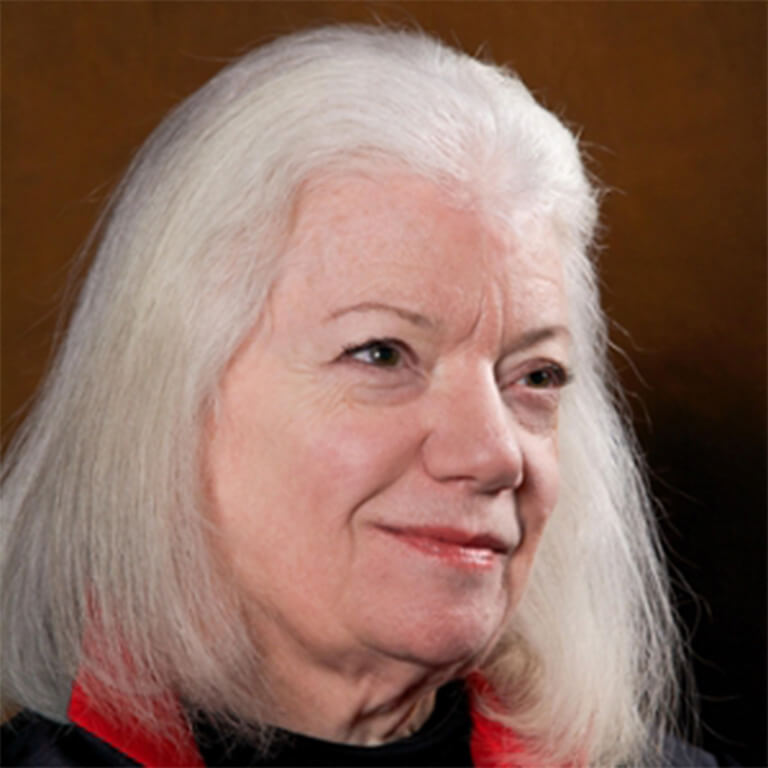Indiana University
Bloomington, IN 47405

Dr. Sue Carter is a Distinguished University Scientist and Rudy Professor Emerita of Biology at Indiana University. A career biologist, Carter has studied the endocrinology of love and social bonds for more than three decades. She was the first person to detect and define the physiology of monogamy through her research on the prairie vole. These findings helped lay the foundation for the studies of behavioral and developmental effects of oxytocin and vasopressin in humans.
Dr. Carter served as Executive Director of the Kinsey Institute from 2014-2019.
Dr. Carter studies social bonding, male and female parental behavior, the social control of stress reactivity, and the social control of reproduction—often using animal models such as the socially monogamous prairie vole.
Carter's research focuses on neuropeptide and steroid hormones, including oxytocin, vasopressin, corticotropin-releasing hormone, and estrogen. Her program has discovered important developmental functions for oxytocin and vasopressin and implicated these hormones in the regulation of the neural effects of early social and hormonal experiences.
Carter also has held professorships in psychiatry at the University of North Carolina, Chapel Hill, and the University of Illinois at Chicago. Prior to these positions she was a distinguished university professor in biology at the University of Maryland, and earlier was a professor of psychology and ecology, ethology and evolution at the University of Illinois at Champaign-Urbana.
Carter C.S., Ahnert L., Grossmann K., Hardy S.B., Lamb M., Porges S.W., & Sachser N. (eds.) (2006) Attachment and Bonding: A New Synthesis. MIT Press, Cambridge MA.
Carter, C. S., Lederhendler, I. I., and Kirkpatrick, B. (Eds.) 1997. The Integrative Neurobiology of Affiliation. Annals of the New York Academy of Sciences, Vol. 807. (Re-released by MIT Press, Cambridge, MA, 1999).
Carter, C. S. 2025. The psychedelic peptide paradox: A hormetic hypothesis. Comprehensive Psychoneuroendocrinology 23:100303.https://doi.org/10.1016/j.cpnec.2025.100303
Nazarloo, H. P., Kingsbury, M.A., Lamont, H., Dales, C.V., Nazarloo, P., Davis, J.M., Porges, E.C., Cuffe, S.P., and Carter, C.S. 2025. Oxytocin, vasopressin and stress: A hormetic perspective. Current Issues in Molecular Biology https://www.mdpi.com/1467-3045/47/8/632
Horn, A.J., Cole, S., Nazarloo, H.P., Nazarloo, P., Davis, J.M., Carrier, D., Bryan, C., Carter, C.S. 2024. Severe PTSD is marked by reduced oxytocin and elevated vasopressin. Comprehensive Psychoneuroendocrinology 19: 100236. https://doi.org/10.1016/j.cpnec.2024.100236
Carter, C.S. Bluthe, R-M, Connelly, J. J., & Kingsbury, M.A, 2024. Oxytocin: Not “just a female hormone.” Comprehensive Psychoneuroendocrinologyhttps://doi.org/10.1016/j.cpnec.2024.100273
Carter, C. S. 2023. Close encounters with oxytocin. Comprehensive Psychoneuroendocrinology 15: 100189.https://doi.org/10.1016/j.cpnec.2023.100189
Carter, C. S. & Kingsbury, M.A. 2022. Oxytocin and oxygen: The evolution of a solution to the ‘stress of life.’ Philosophical Transactions of the Royal Society of London, B · DOI: 10.1098/rstb.2021.0054
Carter, C.S. 2022. Sex, love and oxytocin: Two metaphors and a molecule. Neuroscience and Biobehavioral Reviews, 143: 104948. doi: 10.1016/j.neubiorev.2022.https://pmc.ncbi.nlm.nih.gov/articles/PMC9759207/
Carter, C.S. 2022. Oxytocin and love: Myths, metaphors and mysteries. Comprehensive Psychoneuroendocrinology 9, 1001007 https://pubmed.ncbi.nlm.nih.gov/35755926/.
Ellis, B.J., Horn, A.J., Carter, C.S., van IJzendoorn, M.H., & Bakermans-Kranenburg, M.J. 2021. Developmental programming of oxytocin through variation in early-life stress: Four meta-analysis and a theoretical reinterpretation. Clinical Psychology Review 86: 101985. June 2021. https://doi.org/10.1016/j.cpr.2021.101985
Horn, A.J., & Carter, C.S. Love and longevity. 2021. Comprehensive Psychoneuroendocrinology 8, 100062. https://www.sciencedirect.com/science/article/pii/S266649762100062X
Carter, C. S., Kenkel, W. M., MacLean, E. L., Wilson, S. R., Perkeybile, A. M., Yee, J. R., Ferris, C. F., Nazarloo, H. P., Porges, S. W., Davis, J. M., Connelly, J. J., & Kingsbury, M. A. 2020. Is oxytocin “Nature’s medicine?” Pharmacological Reviews Oct;72(4):829-861. Doi: 10.1124/pr.120.019398. https://pharmrev.aspetjournals.org/article/S0031-6997(24)00978-5/fulltext
Kinsey Institute
Lindley Hall 305